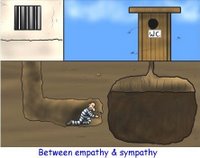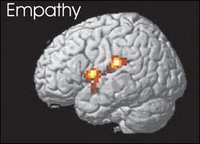Empathy, is a bridge to mutual human understanding and key to resolving or preventing conflict. This is true on a micro and macro level. In everyday situations, it could be one wondering why a child, or co-worker is in a bad mood that day, or it could be a dispute between religious, cultural, political groups or nations.
Empathy is imagining the other person's or groups point of view, placing yourself in their context, and seeing the challenges they may have, or knowing how they evolved to the point they're at. Empathizing can potentially hinder hatred from happening, whereas hatred makes it harder for someone to empathize with the hated. Without empathy, perspective and mutual understanting mis-communication can occur and escalate.
In order to come to agreements amidst hatred, opposing positions have to be willing to mentally try and understand in an objective way, how people or groups act as they do. The more hatred the harder this is because empathizing involves overcoming an image of the other party as being wrong or bad, malacious, or villianous. It means, as hard as it is to do at times, placing yourself in the other person's mind, situations, and it takes you to, in a way, a possible rationale, or understanding of how the opposing party may justify their acts or words, that is, understanding the possible reasons for the other's point of view. By empathizing, one may be able to relate to some of the background, behaviours, experiences of another. Therefore, this understanding can be a bridge to overcoming conflict.
Despite individual, religious, political, cultural, racial, language, or gender differences, etc., people have many things in common. People have basic needs, food, water, living comfort, safety, respect, acknowledgement, self-esteem, friendship, love and belongingness, and ultimately as the psychologist Maslow termed it, self-actualization. Everyone in the world has this. In terms of world conflict, world leaders need to understand commonalities, and understand why some or many of these needs are not achieved. In terms of world teaching, each country may have it own history, religion and language teachings in their respective learning institutions, but perhaps there needs to be a new universal subject that representatives from all over the world agree on. That subject could be called "Understanding Others", or "Empathy". In terms of world teaching, each country may have it own history, religion and language teachings in their respective learning institutions, but perhaps there needs to be a new universal subject that representatives from all over the world agree on. That subject could be called "Understanding Others", or "Empathy".
Understanding between peoples was always important, but the world sure could use more empathy now. It has to be practised by all opposing sides.
The West and radical religious views are polarized and are at war. In a discussion to bridge opposing cultures, there may need to be open introspection into each parties own actions, lifestyles, and other cultural divides. I found it somewhat comforting on Wednesday, that important Islamic leaders officially condemned other Muslims who may be involved in violent acts in our country. It seems to have been a long time in coming, but they seemed be empathetic to concerns of non-Muslim Canadians. Similiarly, despite what radical terrorists carry out, we always need to empathize with another culture that shares our country, and to always put into perspective who the terrorists are and what extreme views they represent. Obviously the vast majority of Muslims are not represented when a terrorist bombs innocent people. But there is no doubt many are feeling paranoid, frightened, and unfairly tarred with the same stereotype as actual terrorists. Other groups and religions have sometimes have felt similiar unfair yet subtle societal snubs, or outright prejudices, because member of that group or religion has committed crimes, so it isn't fair to treat all members of that group as criminal.
It is hard to be empathetic sometimes. But in order to help stop conflicts, there needs to be more understanding between different worlds leaders, and important influential people. Looking into someone else's mind will help then see themselves, and reflect on what their respective society looks like from the outside. There are many groups and people whose empathy concentration is central to their profession, but I think people everywhere need to develop more empathy skills. This is true on a routine daily basis with co-workers and friends, and also on a large scale in the world. |
------------------------------------------------------------
Quotes on empathy1. The greatest virtue of
Dr. (Martin Luther) King - to quote from his tribute to Dr. W.E.B. DuBois -
was his committed empathy with all the oppressed and his divine dissatisfaction with all forms of injustice.2. He (Dr. King) did not criticize white people. He understood they were as they were because of their backgrounds and experience. He appealed to whites as good neighbors:
The good neighbor looks beyond the external accidents and discerns those inner qualities that make all men human and, therefore, brothers.
He was saturated with empathy and he requested that whites feel the same empathy towards blacks. He was merely requesting that white Americans live up to their professed ideals. King proclaimed:
"We must learn to live together as brothers or perish together as fools."
3. "The most valuable things in life are not measured in monetary terms. The really important things are not houses and lands, stocks and bonds, automobiles and real state, but friendships, trust, confidence, EMPATHY, mercy, love and faith."
- Bertrand Russell
4. "I do not ask how the wounded person feels. I simply become that wounded person."
- Winston Churchill



1 comment:
vimax canada
vimax canada
vimax canada
vimax canada
vimax canada
vimax canada
vimax canada
vimax canada
vimax canada
vimax canada
vimax canada
vimax canada
vimax canada
vimax canada
vimax canada
vimax canada
vimax canada
vimax canada
vimax canada
pembesar-alat-vital-cobra-oil-usa/
alat-bantu-sex-vagina-senter/
vagina-getar-2-lubang/
vagina-getar-suara-goyang-silicon-electric/
boneka-sex-full-body/
kondom-kristal-duri/
neosize-xl-original-obat-pembesar-penis-dan-pemanjang-penis-alami/
/jual-obat-perangsang-gairah-wanita-sex-drops-germany/
obat-herbal-vitalitas-vigrx-plus-original/
vimax-extender-dan-vimax-pills-asli-alat-herbal-untuk-terapi-pembesar-penis/
alat-pembesar-payudara-pembesar-payudara-patent-vacum-pembesar-payudara/
pro-extender-alat-pembesar-penis-termodern/
cara-pemesanan/
Post a Comment